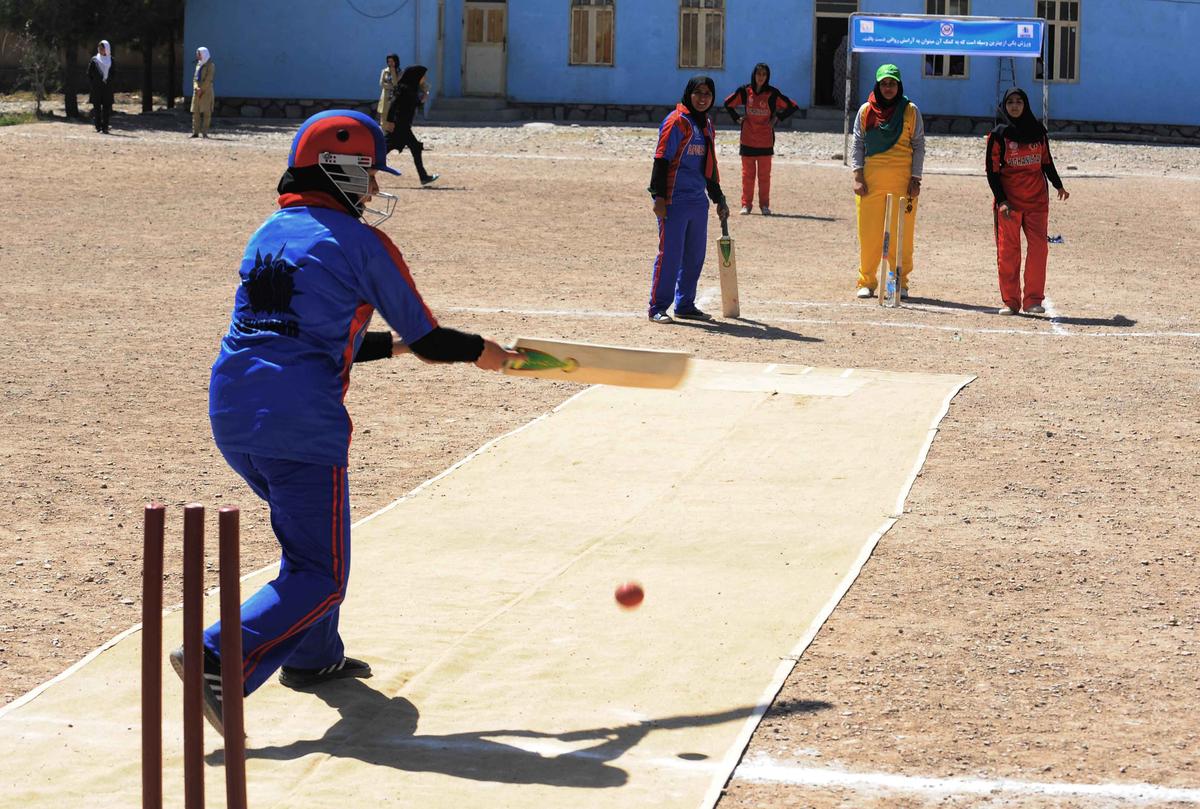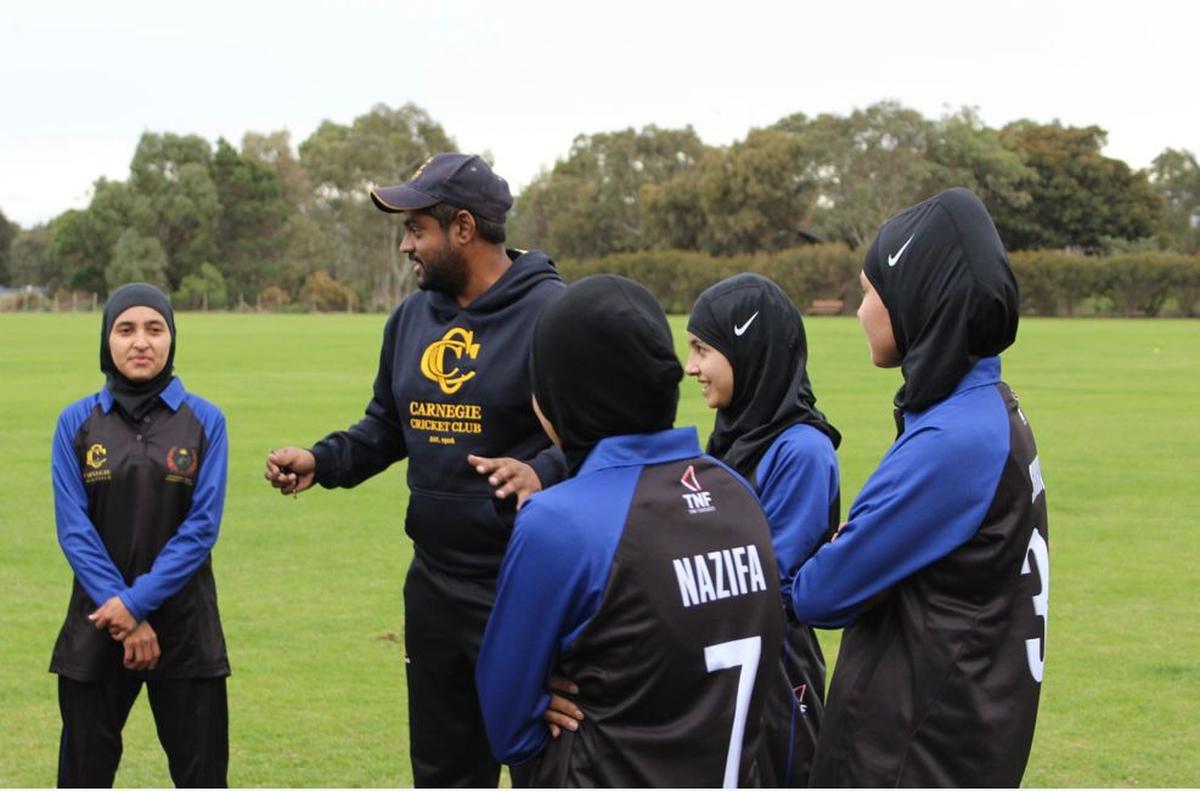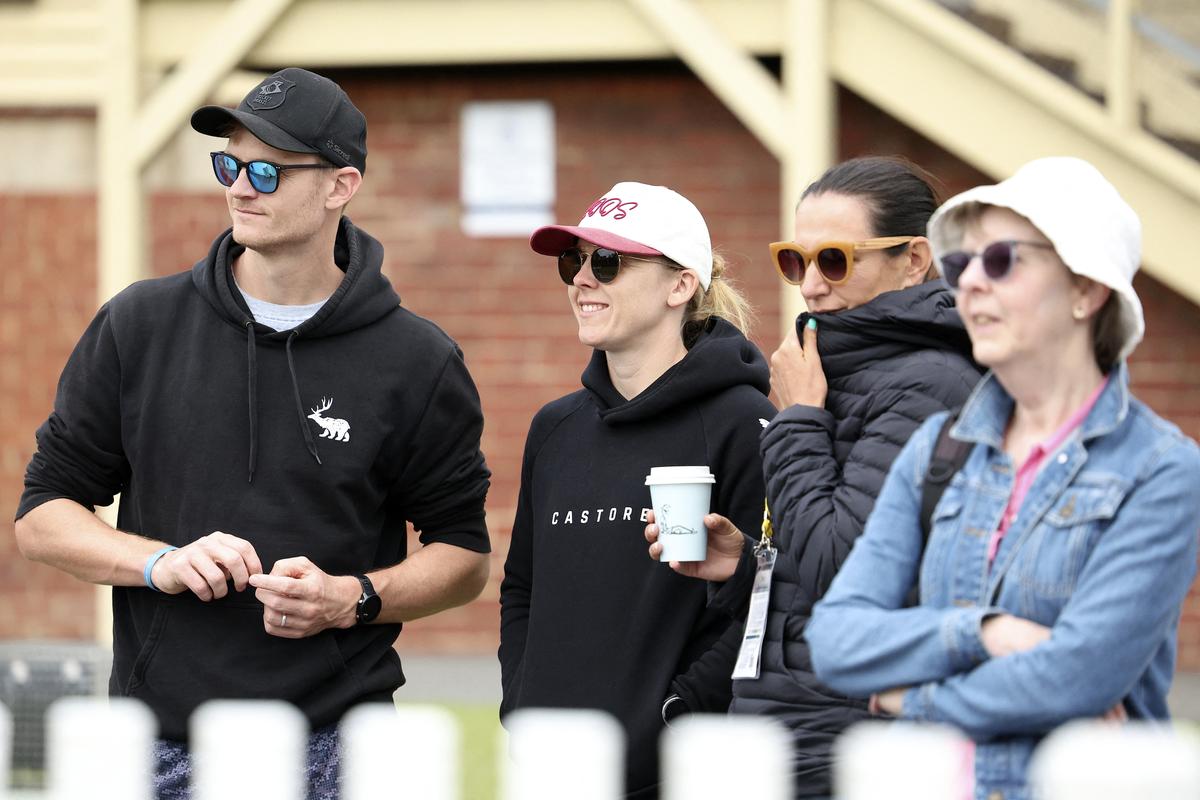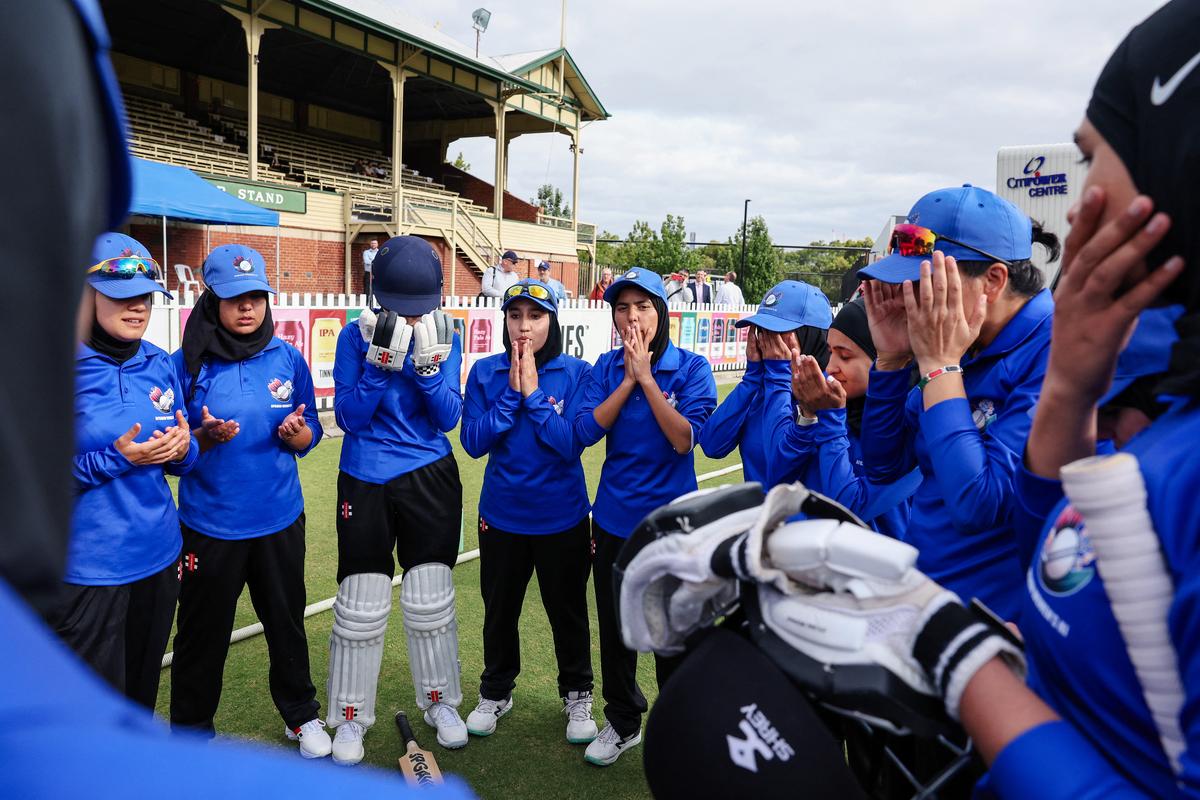The educated middle class in Herat, the third-largest city in Afghanistan, had a saying that gave it strength through its resistance to the Taliban.
When Herat falls, Afghanistan will fall.
Firooza Amiri, one among 25 centrally contracted women cricketers in the country, held that thought close as she sat in her ancestral home with her grandmother for company in 2021. News channels and family WhatsApp chats were flooded with information of the Taliban closing in on Herat and its neighbouring areas.
An educational and cultural hub in the region, the city had long been known for its progressive thinking and artistic expression, besides being a key economic centre. Over the course of history, the scent of saffron, that has long been associated with Herat, has often given way to a putrid air, reeking of bloodshed and plunder. This time too, Herat fought, but ultimately fell to the Taliban on August 12.
Firooza knew she needed to leave.
Nearly four years have passed since. Australia is the new home to over 20 such cricketers and their families who were evacuated from Afghanistan. Three women ŌĆō former Australian captain Mel Jones, Emma Staples (currently a faculty member at Victoria University), and Dr. Catherine Ordway, a Sport Management professor at the University of Canberra ŌĆō gathered their resources and contacts┬Āto arrange humanitarian visas for more than 120 people.
From left to right: Afghanistan WomenŌĆÖs XI Nahida Sapan, former Afghan womenŌĆÖs coach Diana Barakzai and former Australian cricketer Mel Jones prior to the coin toss before the start of the charity match against Cricket Without Borders XI at Junction Oval on January 30, 2025.
| Photo Credit:
AP
From left to right: Afghanistan WomenŌĆÖs XI Nahida Sapan, former Afghan womenŌĆÖs coach Diana Barakzai and former Australian cricketer Mel Jones prior to the coin toss before the start of the charity match against Cricket Without Borders XI at Junction Oval on January 30, 2025.
| Photo Credit:
AP
Many of the Afghan girls now go to university, have part-time jobs and play club cricket in Melbourne and Canberra. Four of the women also routinely play Victoria Premier Cricket, the stateŌĆÖs elite club tournament.
From barely speaking English to fluently handling interviews without assistance, undertaking educational exchange programmes to the US and working with Cricket Australia in voluntary capacities, life now looks starkly different from what it was like and threatened to become in Afghanistan.
Into the deep end
For a girl raised to be independent and free-thinking, life as a refuge where oneŌĆÖs whole sense of self had to be constructed from scratch, was hard to say the very least. Firooza ŌĆō who plays cricket for Dandenong Cricket Club in Melbourne ŌĆō tells Sportstar that the change was harder on her parents, who had known nothing outside Afghanistan and their way of life at home.
ŌĆ£ItŌĆÖs been tough on my parents. At the age of 40 and 50, itŌĆÖs not easy to be a refugee in another country, away from everything you know and love. ItŌĆÖs a new world and itŌĆÖs challenging but itŌĆÖs a sacrifice theyŌĆÖve made for the safety of their children.ŌĆØ
Sitting in a hotel room in Melbourne in 2021, Firooza and her family had cricket for company. Following the T20 World Cup kept them sane as they completed their mandatory COVID-19 quarantine. Back then, English was a hurdle for the family and they relied heavily on interpreters.
READ | Champions Trophy 2025: Players in tricky situation over boycott calls, says Afghanistan coach Jonathan Trott
But cricket was a common language. FiroozaŌĆÖs first ache was for a cricket kit and Jones, who was there to greet the families arriving in Melbourne, handled it.
After weeks, if not months, of direct threats to their lives, it was now time to rebuild this new one they had been gifted.
However, it didnŌĆÖt take much for this family to be transported right back home to Herat and start from square one. War-torn as it was, Firooza says she can still remember every road, every street corner.
ŌĆ£Drop me off at the airport and I can walk back home,ŌĆØ the smile she has when mentioning her hometown quickly vanishes. ŌĆ£But itŌĆÖs a home I can never go back to. Not as long as the Taliban is there. Maybe not ever again.ŌĆØ
Memories of murder
ŌĆ£My parents lived through their first regime,ŌĆØ Firooza recollects.
ŌĆ£When I was born, there was no Taliban. We only studied about their regime in school. We knew how they had been, the restrictions in place. We always knew who they were. I never knew there would come a time when I would experience it myself. They are a terrorist group and everyone is scared of them.ŌĆØ
Before her city fell, she remembers being holed up in her residence for over a month, fearing for her safety. Pursuing cricket had placed a massive target on her back. Even before the groupŌĆÖs complete takeover of the country, the Taliban routinely raided communities looking for women pursuing sports, having deemed it illegal.
ŌĆ£My sister was a crazy cricket fan. She was always on the cricket ground. Herat too was a city more in love with football than cricket. So I went with her one day. I picked up a bat to play and see what all the fuss was about and there was no turning back.

Afghan girls play cricket on the school grounds in Herat on September 2, 2013.
| Photo Credit:
AFP
Afghan girls play cricket on the school grounds in Herat on September 2, 2013.
| Photo Credit:
AFP
ŌĆ£From thereon, I either skipped lessons to play cricket or stayed back after school for a game.ŌĆØ
She found support in her father who would say, ŌĆ£ThereŌĆÖs nothing that my son can do that my daughters cannot do.ŌĆØ
AfghanistanŌĆÖs womenŌĆÖs team was formed in 2010 but the outfit only played one tournament before conservatives put a stop to any activity involving women and the word ŌĆśsportŌĆÖ. In 2020, the Afghanistan Cricket Board (ACB) conducted a camp and consequently handed out 25 central contracts ŌĆō Firooza was one among them ŌĆō with hopes of at least conducting matches with other Islamic countries. Their ambitions were soon torn to bits by the talons of the Taliban.
A life that should have involved bilateral games, training and pride now became about survival.
The women destroyed every trace of their existence, save the contracts which proved to be vital documentation in aiding their evacuation.
They left their hearts behind. Firooza had to abandon her grandparents, her old home and the last few pieces of a liberal childhood that gave her the audacity to dream.
For these cricketers, no relics of the past remain. No photos on the phone, no postcards, no albums, no newspaper clippings- nothing.
ŌĆ£The Taliban was checking homes. If there was a girl there playing cricket, or if they discovered kit belonging to a girl, the family would be killed. I burnt everything that was close to my heart – my medals, my kit, everything I had achieved in my six years of playing, coaching and umpiring.
ŌĆ£The only thing I saved was my Afghanistan National Day uniform, which had my countryŌĆÖs name on the back. I wore it under the one dress I took. I came to Australia with one backpack.ŌĆØ
Overcoming trauma
In early 2022, Arvind Suresh ŌĆō a sports management graduate and former Cricket Victoria employee who originally hails from Chennai, India ŌĆō was roped in to coach the Afghanistan girls.

Arvind Suresh with the Afghanistan women cricketers.
| Photo Credit:
Special Arrangement
Arvind Suresh with the Afghanistan women cricketers.
| Photo Credit:
Special Arrangement
ŌĆ£Emma (Staples) was my colleague at Cricket Victoria and she reached out to me then asking if there was a club these girls could play in,ŌĆØ Suresh tells Sportstar.
ŌĆ£I was playing for Carnegie Cricket Club. ItŌĆÖs a very inclusive space so I suggested they have a training session here and if they like it, they can figure out joining the club or pursue other alternatives.ŌĆØ
The Afghan girls were enrolled in the Mid Year Cricket Association, a winter tournament in Australia.
ŌĆ£These girls wanted to play as a group. It might not always be the case, especially when they enter the club ecosystem, where they will get split according to skill level. All they wanted though was to play as the Afghan team,ŌĆØ he adds.
That opportunity did come for them, four years later.
On January 30, hours before the Ashes Pink Ball Test at the Melbourne Cricket Ground, 13 out of the 19 contracted cricketers who were evacuated from Afghanistan came together to play against an organisation called Cricket Without Borders. The match was well attended by the whoŌĆÖs who of the Australian Government. Even England captain Heather Knight was spotted cheering on the Afghan girls.

England womenŌĆÖs captain Heather Knight (second from left) watches the charity match against Cricket Without Borders XI at Junction Oval in Melbourne on January 30, 2025.
| Photo Credit:
AFP
England womenŌĆÖs captain Heather Knight (second from left) watches the charity match against Cricket Without Borders XI at Junction Oval in Melbourne on January 30, 2025.
| Photo Credit:
AFP
Clad in blue, this Afghan team did not have the legitimacy of their nationŌĆÖs identity without ICC recognition. Benafsha Hashimi, one of the players in the Afghan XI, designed the logo for their kits – a red tulip and a golden wattle around a cricket ball – bringing together the national flowers of Australia and Afghanistan.
They lost the match that day, but that game, the chance to be an Afghanistan team ŌĆō even if not officially ŌĆō was a big win for a bunch that never thought theyŌĆÖd be able to touch a cricket bat and ball again. Suresh co-coached this side, with life coming full circle for him too.
ŌĆ£One of my earliest memories of the girls is this visual of them walking from Carnegie Station to the cricket club which is roughly a 10-15 minute walk. The entire time, they walked as a pack, holding hands, tight together, walking slowly cautiously towards the club. They wouldnŌĆÖt talk much then, raised their heads very little.
ŌĆ£In the first training session, we had a club photographer there to take a few photos so we could show our members what we were up to. Majority of the girls at the time refused to be photographed and understandably so.
Suresh remembers one particular training session at the Monash University campus that he says will stay with him for life.
ŌĆ£We were training them with the Uni team here during which something fell on the asbestos roof. Some of the girls just instantly went down on the ground. That absolutely blew my mind. They would tell us stories of how neighbours pelted stones at them if they caught them practising cricket, how they had to burn up their past before coming here. It was extremely eye-opening.ŌĆØ

Afghanistan WomenŌĆÖs XI players say a prayer before the charity match against Cricket Without Borders XI at Junction Oval in Melbourne on January 30, 2025.
| Photo Credit:
AFP
Afghanistan WomenŌĆÖs XI players say a prayer before the charity match against Cricket Without Borders XI at Junction Oval in Melbourne on January 30, 2025.
| Photo Credit:
AFP
Cut to 2025. Suresh recalls how the team gathered together for a huddle before the exhibition game and prayed in unison. He remembers the loud scream when the Afghan XI scored its first run. Finally, they were Afghan cricketers somehow, an identity their own nation refused to give them.
The suffering of silence
The menŌĆÖs side, which for years now has been showing sparks of brilliance, particularly on the big stage, was a source of inspiration for these women ripped away from their motherland.
ŌĆ£By the time I started watching cricket regularly, the Afghan menŌĆÖs side was everywhere, competing in World Cups, Champions Trophies and the works. ThatŌĆÖs all our dream was, to represent Afghanistan. To have that name on our back. The men got to do it and we wanted to too,ŌĆØ Firooza says.
Cricket Australia was the first board to announce a boycott of bilateral games with Afghanistan when it ŌĆ£indefinitely postponedŌĆØ a Test fixture against the nation in 2021. Subsequent series were also not played citing deteriorating state of human rights for women in Afghanistan. This involved cruel diktats like mandatory covering of their bodies including their eyes in thick veils to ŌĆśavoid leading men into temptation and viceŌĆÖ, ban on womenŌĆÖs voices in public – no singing or reading aloud even from within their homes, and of course, no participation in public life, workspaces or sport.
Australia only plays Afghanistan in ICC events.
There are voices calling for the complete boycott of the Afghan menŌĆÖs cricket team, saying their existence legitimises the TalibanŌĆÖs ŌĆśgender apartheid.ŌĆÖ Recently, Taekwondo player Marzieh Hamidi spoke to The Hindu about how letting the menŌĆÖs cricket team go on normalises the Taliban. Earlier, she told CNN how her male compatriots in taekwondo treated her like a foreign athlete when they came face to face at the World Championships in Azerbaijan a few years ago.
ŌĆ£They are the Taliban team for me, not the Afghan team,ŌĆØ she was quoted then.
Members of the Afghan menŌĆÖs team have often been asked to comment on the situation but understandably hold back fairly severely in their responses. Safety of their loved ones may well be orchestrating their silence.
ŌĆ£Everyone likes to see everyone play. As I said before, when it comes to politics and those things which we cannot control – we are only cricket players we can control things on the ground and we belong to the ground and we are always trying to give our best when we play,ŌĆØ Afghan captain Hashmatullah Shahidi said during the ongoing Champions Trophy amidst loud calls in England calling on the board to boycott their fixture against the side in the tournament.
Far away from the political storm in Pakistan, Firooza was hurt that not one player privately reached out to the women who escaped.
ŌĆ£I wish that they had reached out to us and at least been with us. ItŌĆÖs easy to talk about relocation and abandoning home in a conversation like this, but we have gone through so much. Our youngest teammate was 14 when she had to leave Afghanistan. What does she know about life? ItŌĆÖs heartbreaking that the Afghanistan menŌĆÖs team never came to us and at least talked to us and asked us how we are doing and feeling.ŌĆØ
Anguish turns to anger when Firooza mentions the ICC ŌĆō cricketŌĆÖs world body ŌĆō and the ACB.
ŌĆ£We didnŌĆÖt have a choice. We left our country to stay alive. We expected the ACB to support us. But they didnŌĆÖt. When we moved to Australia, we wrote to the ICC but they said nothing apart from ŌĆśWeŌĆÖre glad youŌĆÖre safe.ŌĆÖ ThatŌĆÖs not something we were asking for.
ŌĆ£We die every day because the dream we all collectively saw is broken. We spent so many years of our lives trying to be cricketers. All for what? They are breaking their own rules as a governing body, as an international council. A full member nation must have a womenŌĆÖs team and menŌĆÖs team and Afghanistan doesnŌĆÖt have that.ŌĆØ
The ACB still receives full funding from the ICC despite these developments, a severely criticised fact in cricketŌĆÖs public sphere.
ŌĆ£They are still sending the funds back home to Afghanistan. ACB doesnŌĆÖt accept us because of the danger to them. Fine. What about the ICC? They can recognise a refugee team and divert funding here for us to play the sport we have fought so long to pursue,ŌĆØ Firooza fumes.
While the exhibition game is a start, for these women, even escaping the Taliban has not let them escape the consequences of the regime and the doors it has shut for them. Jones along with several key members of AustraliaŌĆÖs sporting ecosystem eventually set up a fundraiser called Pitch Our Future for the Afghan girls. This drive aims to raise AUD 1.5m to fund a three-year program. It seeks to cover English Language Certification, High School and Tertiary Education scholarships, specialised cricket coaching, support (physical and mental) and playing opportunities for these women.
ŌĆ£Somehow, I hope this ends with us getting the right to represent Afghanistan again. To be recognised as our nationŌĆÖs team,ŌĆØ Firooza says, her voice cracking as she explains.
The spirit of her city lives on in Firooza, as that of Kabul, Kandahar, and other Afghan regions survive in the women who left their souls behind at home.
But the Afghan spirit will never die. In a regime that forbids their voices from being heard, these women are screaming for justice. ItŌĆÖs time for authority to listen.












